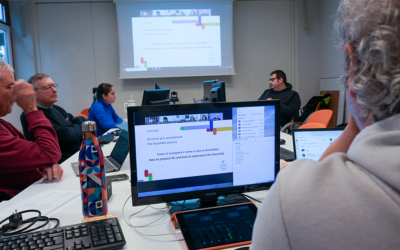
“I have been a very fortunate man. How I’d like to be able to express all the love that God has shown to me, though I think it would be impossible to put into words all that I’ve received [from Him].” With these words Oreste Basso began to describe the golden thread that he saw woven through the story of his life. He was born in Florence, Italy, on January 1, 1922. His family instilled in him Christian principles and rectitude of mind. He loved the humanities and dreamt of a life and career that would be just right for him. The experience of the War was “a dreadful lesson because in the war you could see all human ideals collapsing.” “The only thing that remained standing after the war,” he recalled, “were the natural affections of the family.” After graduating in engineering in 1946 he found a job at a factory in Sesto San Giovanni (Italy), which was then considered the “Stalingrad of Italy”. He lived in Milan and in the evenings was often at a canteen where he met some friends – Piero Pasolini, Danilo Zanzucchi, Guglielmo Boselli and Alfredo Zirondoli – who were later among the very first people to follow in the adventure of the focolares. They would discuss Maritain, Neo-Scholasticism, music and art. One of them, Giorgio Battisti, one day invited Oreste to “get to know something beautiful, some young people who live the Gospel.”
One of these young people named Ginetta Calliari, who is among the first companions of Chiara Lubich, went to meet them and was bombarded with questions. Quietly she would listen to them until late in the night. Each month she would travel from Trent just to meet with them. “We began to realize,” Oreste said, “that the Gospel was something that was to be lived not by people who were far from us, but by us, by me, by him, by the others.” The fruits of this new life were evident in Oreste’s life. He earned the esteem of one of his subordinates who was very active in politics, and came to know of his evangelical ideal. He told Oreste: “If you believe in this God, then I can also believe in Him in the way you say.”
In 1959 Oreste left home and went to be part of the focolare in Milan together with the others who had followed this path after having heard it announced to them by Ginetta. Then he met Chiara: “Such a beautiful encounter!” he said. “She seemed such a stupendous person to me, in her great humility and light.”
Meanwhile the number people began to grow in the cities of Italy, who were eager to know the nascent Movement. Oreste moved to the city of Parma with Lionello Bonfanti. His story has the flavour of the beginnings: “There was a couch for sleeping, and for eating we bought an alcohol stove. Usually we ate cheese, lots of milk – milk saved us! But we were truly happy.”
A few years passed and the Focolare Movement-Work of Mary – this was the name given by Chiara to this new eccesial phenomenon – continued to spread and take form in its mutiple aspects. Oreste was therefore asked to transfer to Florence and take on a role of responsibility. He immediately agreed in spite of his job where he had just been offered another promotion. The general director was himself saddened because of Oreste’s departure from the company. “It was the begining of another life,” Oreste said, “totally immersed in the charism of Chiara and being one of its bearers.”
In the late 1950’s he was recalled to Rome where always at Chiara’s side, with his discreet and joyful style, he continued his work right on the forefront, assisting in drawing up the Statutes of the Work of Mary. In 1981 he was ordained a priest, a ministry which he considered to be a privilege and a call to greater love.
He was elected co-president of the Movement in 1996 and played a fundamental role at Chiara’s death (March 14, 2008), as well as during the General Assembly that followed, in which the successor of the founder was elected.
The messages that have arrived after the news of Oreste’s death from the Holy Father through Vatican Secretary of State Cardinal Bertone and from president of the Pontifical Council for the Laity, Cardinal Rylko, testify to his radically evangelical lifestyle as well as to the simple and sincere relationships that Oreste Basso knew how to build each day until the end.
Numerous testimonies continue to arrive, all expressing gratitude and affection for Oreste.




0 Comments